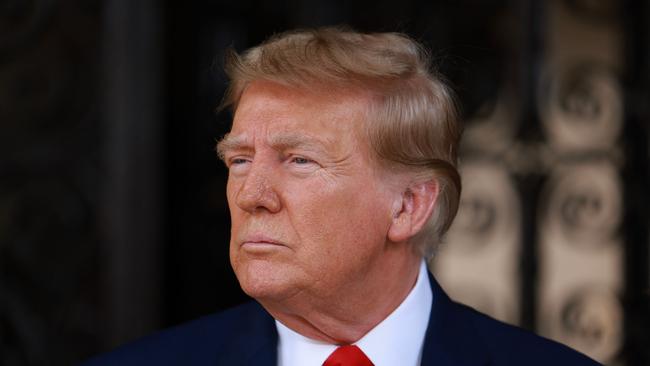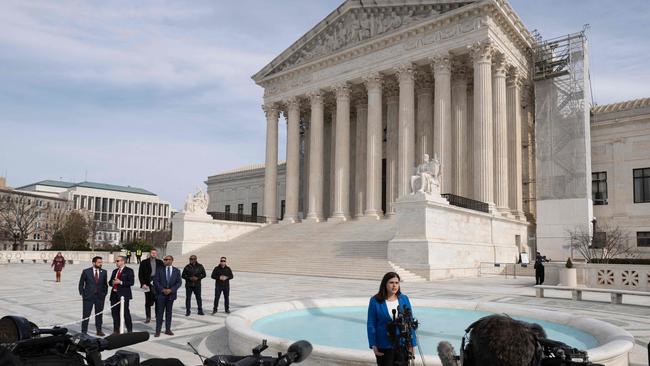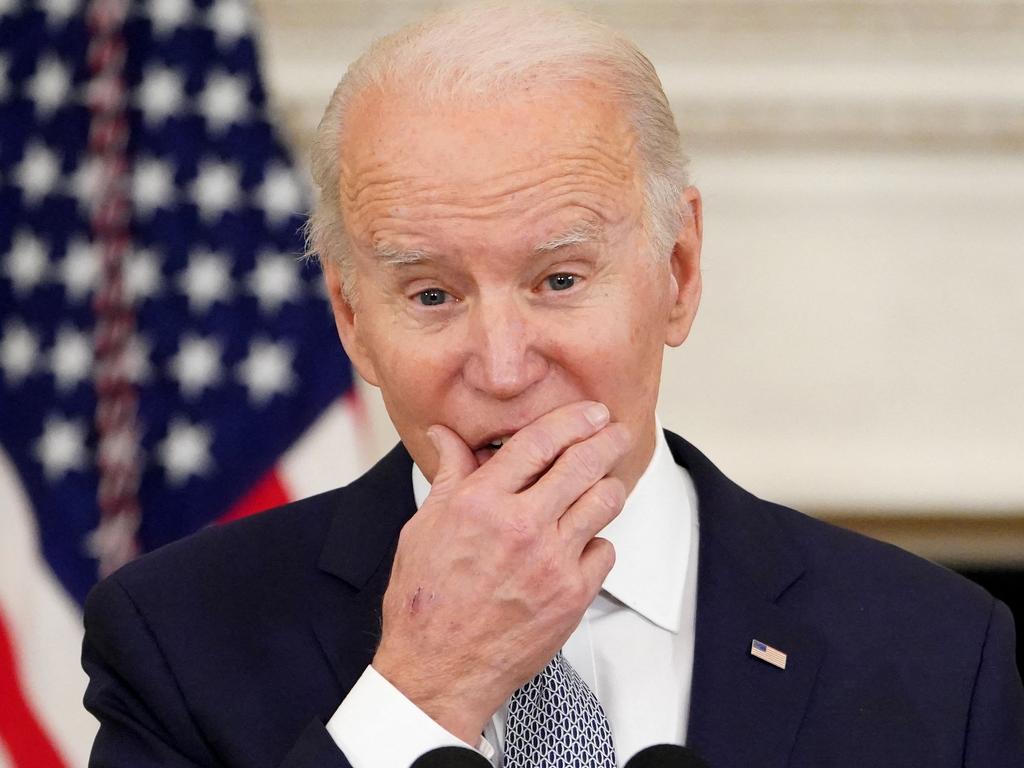Supreme Court takes up Donald Trump’s ballot eligibility
US justices hear arguments on whether 14th Amendment’s disqualification clause bars the former president’s return to the White House.

A cross-section of Supreme Court justices voiced scepticism about a Colorado ruling that barred Donald Trump from the ballot, as the court for the first time heard arguments over disqualifying a presidential candidate for allegedly engaging in insurrection.
The Colorado decision “is wrong and should be reversed for numerous independent reasons,” Jonathan Mitchell, a lawyer for the former president, told the court on Thursday (Friday AEDT), at the outset of the hearing.
A Supreme Court decision affirming that ruling would “take away the votes of potentially tens of millions of Americans,” Mitchell said.
Signalling sympathy for that argument, Justice Samuel Alito said the Colorado ruling could have severe consequences if upheld. He also said there was little if any history of a state attempting to disqualify someone from a federal office in this way.
The case involves not only the mayhem of Jan. 6, 2021, when a pro-Trump mob raided the Capitol in an effort to prevent lawmakers from certifying President Joe Biden’s victory in the November 2020 election. Equally at issue is the meaning of a spare phrase added to the Constitution following the Civil War disqualifying from public office former federal and state officers who “engaged in insurrection or rebellion against” the US and gave “aid and comfort” to its enemies.
There is little legal authority on applying the insurrection stricture, one of several provisions adding the Union’s war aims to the Constitution through the 14th Amendment. Contained in the amendment’s Section 3, it had a brief heyday; Congress passed an amnesty for most former rebels in 1872, and in 1898, President William McKinley signed legislation restoring the right of all former Confederates to hold public office.
Chief Justice John Roberts quickly pressed a lawyer for the Colorado voters challenging Trump’s eligibility, saying the whole point of the 14th Amendment was to restrict the power of the states.
Roberts said Colorado’s decision, if upheld, would unleash a flood of similar eligibility challenges in the future, including ones seeking to block Democrats from the ballot.
“That’s a pretty daunting consequence,” the chief justice said, adding that the high court would be thrust into resolving a wave of litigation.
Justice Elena Kagan jumped in and questioned why a single state should get to decide a candidate’s eligibility for the White House.
Added Justice Amy Coney Barrett: “It just doesn’t seem like a state call.” Some lawmakers and legal scholars saw the Jan. 6 attacks as an insurrection, and an advocacy group that had tangled with Trump during his presidency, Citizens for Responsibility and Ethics in Washington, sought to apply Section 3 to the perpetrators. The group’s lawyers filed a suit that led New Mexico courts in 2022 to strip office from a county commissioner who had participated in the attack.

When Trump announced a campaign to retake the White House, the group filed suit in Colorado to remove him from the ballot. State laws there make ballot challenges relatively straightforward. In December, a 4-3 Colorado Supreme Court affirmed a state trial judge’s finding that Trump engaged in insurrection by fomenting the attack, and ruled that he was covered by Section 3.
On appeal to the US Supreme Court, Trump’s lawyers raised several arguments against his disqualification. The presidency, they say, isn’t covered by the disqualification clause, and, regardless, Trump’s actions related to the Jan. 6 attack fall short of insurrection.
Even if the allegations are true and Trump falls under the disqualification clause, the ex-president’s lawyers argue that Colorado courts have no power to enforce it. Instead, they say, Congress needs to spell out procedures for keeping insurrectionists and rebels from public office rather than allowing each state to fashion its own approach.
Justice Clarence Thomas asked about that issue early in Thursday’s session. “What would the role of the state be?” Thomas asked. “Or is it entirely up to Congress to implement the disqualification?”
“It is entirely up to Congress,” Mitchell replied. “There would not be any role for the states in enforcing Section 3, unless Congress were to enact a statute that gives them that authority.” Justice Sonia Sotomayor questioned Mitchell’s arguments, saying it would be rare for state officials to be circumscribed in the way Trump is advocating.
Citizens for Responsibility and Ethics in Washington is representing six Colorado voters who sued to strike Trump’s name – two independents and four Republicans, including a former congresswoman and a former majority leader of the state Senate.
Jason Murray, representing the Colorado voters, presented the state court ruling less as an effort to define the nationwide ballot but rather regulate its own delegation to the electoral college.
Colorado, he said, has the power to choose how to “assign its own electors,” and could forbid those pledged to a candidate who engaged in insurrection. He likened that to the state’s power to prevent other unqualified candidates from the ballot, such as those below the age of 35 or not being natural-born citizens. Some states, he said, permitted such individuals to appear on the ballot, even if they were ineligible to take office should they be elected. But nothing required them too.
The plaintiffs say that nothing in the Constitution makes Section 3 inoperative absent congressional action.
The most vigorous disagreements involve the way Trump’s Jan. 6 actions are characterised. While the ex-president’s lawyers stress that he never explicitly called for violence to stop Congress from certifying the election, the voters point to trial-court findings that Trump’s incessant flogging of his false claims of a stolen election and fuelling of his followers’ feelings of grievance and outrage needed no translation.
Outside Colorado, several pending lawsuits seek to disqualify Trump from the ballot in other states. While several have been rejected, at least at this stage, Trump was barred from the ballot in Maine on insurrection grounds; that December decision from Secretary of State Shenna Bellows, a Democrat, is on hold until the Supreme Court decides the Colorado dispute.
“The weight of the evidence makes clear that Mr. Trump was aware of the tinder laid by his multi-month effort to delegitimise a democratic election, and then chose to light a match,” Bellows wrote in her decision.
Thursday probably won’t be the only time Trump’s name comes before the justices this year. He is expected to appeal Tuesday’s circuit court decision denying him categorical immunity for crimes allegedly committed while serving as president, in a case filed by special counsel Jack Smith over Trump’s efforts to retain office despite losing the 2020 election.
Separate criminal prosecutions and civil suits percolating against Trump in Georgia, New York and Florida could bring other issues to the justices later in the year.
The Wall Street Journal





To join the conversation, please log in. Don't have an account? Register
Join the conversation, you are commenting as Logout